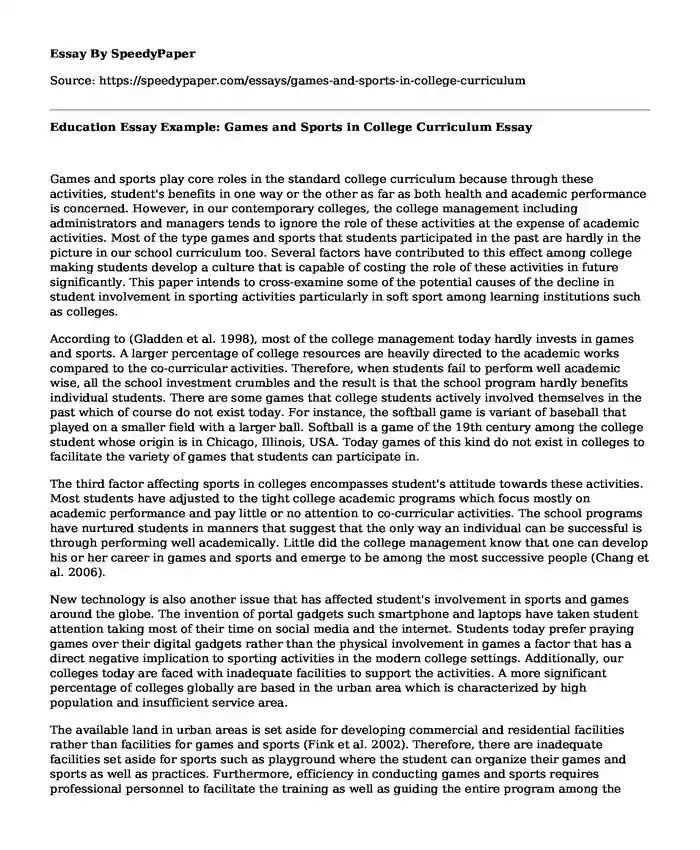Games and sports play core roles in the standard college curriculum because through these activities, student's benefits in one way or the other as far as both health and academic performance is concerned. However, in our contemporary colleges, the college management including administrators and managers tends to ignore the role of these activities at the expense of academic activities. Most of the type games and sports that students participated in the past are hardly in the picture in our school curriculum too. Several factors have contributed to this effect among college making students develop a culture that is capable of costing the role of these activities in future significantly. This paper intends to cross-examine some of the potential causes of the decline in student involvement in sporting activities particularly in soft sport among learning institutions such as colleges.
According to (Gladden et al. 1998), most of the college management today hardly invests in games and sports. A larger percentage of college resources are heavily directed to the academic works compared to the co-curricular activities. Therefore, when students fail to perform well academic wise, all the school investment crumbles and the result is that the school program hardly benefits individual students. There are some games that college students actively involved themselves in the past which of course do not exist today. For instance, the softball game is variant of baseball that played on a smaller field with a larger ball. Softball is a game of the 19th century among the college student whose origin is in Chicago, Illinois, USA. Today games of this kind do not exist in colleges to facilitate the variety of games that students can participate in.
The third factor affecting sports in colleges encompasses student's attitude towards these activities. Most students have adjusted to the tight college academic programs which focus mostly on academic performance and pay little or no attention to co-curricular activities. The school programs have nurtured students in manners that suggest that the only way an individual can be successful is through performing well academically. Little did the college management know that one can develop his or her career in games and sports and emerge to be among the most successive people (Chang et al. 2006).
New technology is also another issue that has affected student's involvement in sports and games around the globe. The invention of portal gadgets such smartphone and laptops have taken student attention taking most of their time on social media and the internet. Students today prefer praying games over their digital gadgets rather than the physical involvement in games a factor that has a direct negative implication to sporting activities in the modern college settings. Additionally, our colleges today are faced with inadequate facilities to support the activities. A more significant percentage of colleges globally are based in the urban area which is characterized by high population and insufficient service area.
The available land in urban areas is set aside for developing commercial and residential facilities rather than facilities for games and sports (Fink et al. 2002). Therefore, there are inadequate facilities set aside for sports such as playground where the student can organize their games and sports as well as practices. Furthermore, efficiency in conducting games and sports requires professional personnel to facilitate the training as well as guiding the entire program among the global colleges. Most college's management pays little attention to this factor when allocating the school financial resources hence leading to the poor performance experience among colleges today.
In summary, youth participation in games and sports in today's colleges has declined dramatically, and yet these activities mean a lot to a student as far as their intellectual and physical development is concerned. Improving the role of these activities is a collective responsibility that calls every individual right from the college management to students as well as the government to take part in improving youth involvement. Most importantly, the college management has a role to play in allocating adequate funds to every department within the school setting to ensure equality in all matters affecting the school curriculum.
References
Chang, B. H., Lee, S. E., & Kim, B. S. (2006). Exploring factors affecting the adoption and continuance of online games among college students in South Korea: Integrating uses and gratification and diffusion of innovation approaches. New Media & Society, 8(2), 295-319.
Fink, J. S., Trail, G. T., & Anderson, D. F. (2002). Environmental factors associated with spectator attendance and sport consumption behavior: Gender and team differences. Sport Marketing Quarterly, 11(1).
Gladden, J. M., Milne, G. R., & Sutton, W. A. (1998). A conceptual framework for assessing brand equity in Division I college athletics. Journal of sport management, 12(1), 1-19.
Shulman, J. L., & Bowen, W. G. (2011). The game of life: College sports and educational values. Princeton University Press.
Cite this page
Education Essay Example: Games and Sports in College Curriculum. (2022, Apr 13). Retrieved from https://speedypaper.net/essays/games-and-sports-in-college-curriculum
Request Removal
If you are the original author of this essay and no longer wish to have it published on the SpeedyPaper website, please click below to request its removal:
- Free Essay on Marketing Strategies Employed by McDonalds and KFC
- Free Essay Example: Coke vs Pepsi
- Free Essay: Should Teenagers Be Given Birth Control?
- Essay Example for Everyone: How to Drive a Manual and Automatic Cars
- Management Essay Example: Operation Consulting, Product and Service Design
- Critical Analysis Essay on President Obama's Inaugural Speech
- Paper Example: Evidence-Based Decisions for Info Disclosure
Popular categories





